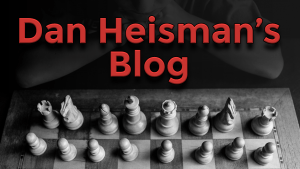Q&A with Coach Heisman Nov 8, 2013
"I don't do better as White than as Black; what is wrong?" On the average, having White against a player of equal value means you should score about 57% of the points (e.g. 40 wins, 34 draws, and 26 losses in 100 games), which translates to about a 70 rating point advantage. If instead you are playing at about the same rating with Black as White or, even worse, playing at a lower playing strength with White, that could be due to several factors:
- Your White opening repertoire is more innocuous (say you play the Colle System for White)
- You like the openings you play as Black more than the ones you play as White
- It's psychological - you prefer to counterattack or play more aggressively with Black, or
- It's coincidence or not really true - you feel you should be doing a LOT better with White but when you only do a little better (as would be the case), you feel there is something wrong.
"Should I take a piece if it will double my pawns?" This is an example of a host of similar beginner question about non-material value that I examine in the article "Not All Bads are Equal". Beginners know not to trade a rook for a bishop because we assign those the approximate average values of 5 pawns and 3 pawns respectively. But if you tell them its bad to double your pawns (and its usually not that bad, but that's a different story), then how do they know if they should double their pawns to win a piece (in material terms, that would be gaining a knight or bishop, each worth a little more than three)? One way of logically considering this: suppose you doubled your pawns and it made them both so bad they were immediately vulnerable and lost. Then that doubling cost you two pawns; that's almost never the case, but that's the point - this is an ad absurdum example. But two is still less than the value of a knight or bishop (roughly averaging about 3.25), so yes, it's pretty much always a slam dunk that it's going to be worth it to double your pawns to win a piece. During the show I gave this example:
A much tougher question involving material for non-material value is "Would you win a pawn if it prevents you from castling?" There's no simple answer to that since the value of not being able to castle varies quite widely, depending upon the position. As a rough general answer it would be "Yes, generally a pawn is worth more than castling", but there's a myriad of exceptions. Another would be "If the queens are already off the board or traded as part of winning the pawn, then yes, it's very likely worth it although you also lose the right to castle" since kings are much more vulnerable in the center when queens are on the board.
I have another article, The Principle of Tactical Dominance, which deals with the fact that material and tactics almost always dominates any single position issue. That's helpful because that means resolving tactical issues usually also obviates some positional ones, so you can often deduce a move's value just when loss or gain of material is ascertained. Reading these two articles should give you further insight on this important question.
As the final aspect to this question, let's ask "Is it ever possible that doubling a pawn is not worth it to win a piece?" The answer is yes, but that's going to be because of the secondary tactical effect of the doubling, say the opening of a line to the king that allows a mating attack. But that's not a positional issue of doubling - that's the side effect of king safety which, in this case, turns out to be greater. Nevertheless, it's still usually correct to win a piece even if that weakens your king (obviously not if it allows a forced mate), which shows you how important winning a piece can be!
"What's the best opening for White?" Well, I guess that's the worst opening for Black, so on the show I immediately rolled out a Fool's Mate in 3 (and you can pick any two first moves for White which allow the white queen access to h5):
However, if the question was legitimate, I doubt that's what was really meant. But there is no opening so good for White that a good player would allow it for Black. Therefore, in general, the best openings, as measured by desirability for high level play, are the ones which offer chances for both players. So asking what's the best opening for White, by itself, is somewhat a moot point. For more on this see my blog "What's a Good Opening?"
Got more of those "Is X good for my chess?" questions. No matter what X is you are interested in any of these, check out the 4th paragraph in my Sep 23 writeup on the show. If X is chess played with a time limit about 10-20 minutes for each player, you can also check out Intermediate Time Controls Hinder Improvement. Looking for chess slower than 10-20 minutes per side here at Chess.com? Check out our Dan Heisman Learning Center; it and other "slow chess" groups feature longer time controls.
As expected, we got a couple of questions about the outcome of Carlsen-Anand. I repeated my earlier prediction of a Carlsen victory but added that I would not be shocked if Anand won, primarily because of the short nature of the 12-game match. When I was young, it was always 24 games; you may feel that 24 is unnecessarily long, but I think at least 16 is more likely to produce the "better" champion. The shorter the match, the more likely the underdog can win. That's OK for fun matches, but don't we want the best chance for the World Champion to be the best player?
Because of the World Championship match, the next show will not be for three weeks (instead of the normal two), until Nov 29. That one will be for Diamond and Platinum members only. Get your questions ready...






